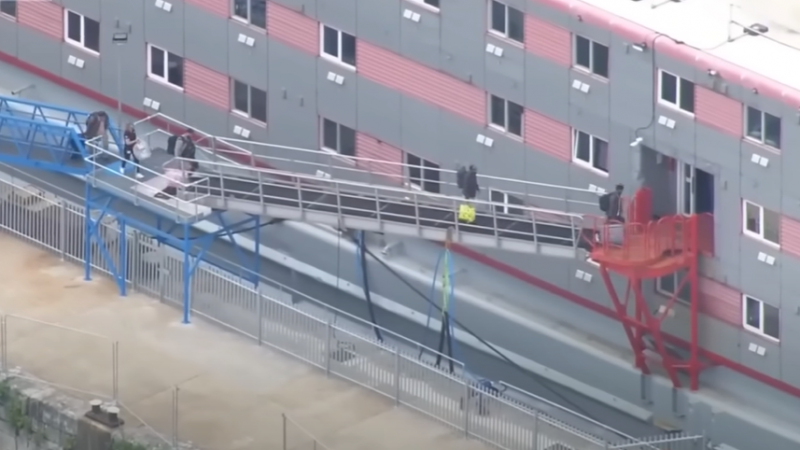Refugee charity calls for not-for-profit asylum system, as it reveals companies profiting from refugees’ ‘misery’
'While the government gives away billions to these companies people seeking asylum are left to live in accommodation that actively harms their health.'
Refugee Action, campaigners for a fairer asylum system in the UK, has launched a ‘Most Wanted’ campaign, which exposes the companies that are profiteering from the government’s ‘cruel’ asylum system. It says responsibility for asylum accommodation must be taken away from private companies and returned to local authorities.
According to the charity, in 2019, the government paid three contractors – Serco, Mears and Clearsprings Ready Homes – £4 billion over 10 years to provide accommodation to people seeking asylum. Additionally, these companies are paid more than £8 million a day to provide contingency accommodation in hotels. In the 12 months to March 2023 alone they received £2.28 billion, says the charity.
The campaigners describe the level of profit flowing into the companies from the asylum system as ‘scandalous.’ It warns that as private companies keep winning lucrative contracts with the Home Office, there is ‘little transparency or monitoring.’ Despite numerous complaints, fines and scandals, the companies, say Refugee Action, keep being awarded more government money.
Its ‘Most Wanted’ campaign informs how in 2020, Serco won a £45m Covid-19 test and trace contact, despite being subjected to a £1m fine for failures in its asylum accommodation contract in 2019.
The campaigners note how in their 2021 strategic report, Clearsprings Group, which prides itself in being “one of the largest providers of housing to the Home Office,” listed its principal activities as ten-year contracts held with the Home Office for the provision of asylum accommodation, support and transport services in the south of England and Wales, increased its profits £4,419,841 to £28,012,487 during the year ending 31 January 2022. The same year, dividends jumped from £7m to £27,987,262, and its three directors shared dividends of almost £28m.
In December 2021, the Guardian reported that flats provided by Clearsprings, the Home Office contractor, were rife with ‘damp, mould, water leaks and pest infestations, and deemed ‘not fit to live in.’
Housing providers the Mears Group have also been caught up in scandals and criticism over the condition of its property for refugees. In May, an asylum-seeking family raised fears about asylum accommodation after they were placed in a boarded-up block of flats on the edge of a derelict and abandoned estate. The family had been placed by the Mears Group in Port Glasgow, in a dilapidated building beside the notorious Clune Park estate, which was first earmarked for demolition in 2011. Only a handful of people still live there.
In its 2022 annual report, the Mears Group stated: “Both financially and operationally, the most significant contracts for the Group are those under which we provide accommodation and support for asylum seekers in the North-East of England, Scotland, and Northern Ireland.”
In 2022, the company enjoyed a profit increase of 37 percent over 2021, with adjusted profits before tax standing at £35.2 million.
Serco, a leading provider of public services, which operates six adult prisons in Britain, runs Yarl’s Wood detention centre. The facility has been the focus of protests at reportedly poor conditions and whistleblowing revealing sex abuse, lack of engagement with mental health in relation to assessment and safeguards, and an ‘anti-immigrant culture.’
A fourth firm, Corporate Travel Management (CTM), was paid £1.6 billion this year to run some asylum accommodation services, including the Bibby Stockholm barge in Portland. The barge has been beset with problems and controversy. In August, ministers were accused of playing Russian roulette with asylum seekers’ lives after it emerged that hundreds could be moved on to the Bibby Stockholm barge despite an inspection finding failings that could take months to repair.
According to Refugee Action, CTM shares surged on a $3bn contract with UK Home Office.
The charity is urging the government to to end the “for-profit” asylum accommodation system and consider other options rather than the current policy. One option would be working with Local Authorities and NGOs to house people in appropriate, high-quality accommodation in the community.
Asli Tatliadim, Head of Campaigns at Refugee Action, says that the asylum accommodation contracts have been a “licence to print money for these contractors but the gravy train must stop.”
“But while the government gives away billions to these companies people seeking asylum are left to live in accommodation that actively harms their health.
“It’s time the government funded local authorities to run the system on a not-for-profit basis and spent every penny of this public money on protecting refugees and strengthening services that all of us rely on.”

Refugee Action, campaigners for a fairer asylum system in the UK, has launched a ‘Most Wanted’ campaign, which exposes the companies that are profiteering from the government’s ‘cruel’ asylum system. It says responsibility for asylum accommodation must be taken away from private companies and returned to local authorities.
According to the charity, in 2019, the government paid three contractors – Serco, Mears and Clearsprings Ready Homes – £4 billion over 10 years to provide accommodation to people seeking asylum. Additionally, these companies are paid more than £8 million a day to provide contingency accommodation in hotels. In the 12 months to March 2023 alone they received £2.28 billion, says the charity.
The campaigners describe the level of profit flowing into the companies from the asylum system as ‘scandalous.’ It warns that as private companies keep winning lucrative contracts with the Home Office, there is ‘little transparency or monitoring.’ Despite numerous complaints, fines and scandals, the companies, say Refugee Action, keep being awarded more government money.
Its ‘Most Wanted’ campaign informs how in 2020, Serco won a £45m Covid-19 test and trace contact, despite being subjected to a £1m fine for failures in its asylum accommodation contract in 2019.
The campaigners note how in their 2021 strategic report, Clearsprings Group, which prides itself in being “one of the largest providers of housing to the Home Office,” listed its principal activities as ten-year contracts held with the Home Office for the provision of asylum accommodation, support and transport services in the south of England and Wales, increased its profits £4,419,841 to £28,012,487 during the year ending 31 January 2022. The same year, dividends jumped from £7m to £27,987,262, and its three directors shared dividends of almost £28m.
In December 2021, the Guardian reported that flats provided by Clearsprings, the Home Office contractor, were rife with ‘damp, mould, water leaks and pest infestations, and deemed ‘not fit to live in.’
Housing providers the Mears Group have also been caught up in scandals and criticism over the condition of its property for refugees. In May, an asylum-seeking family raised fears about asylum accommodation after they were placed in a boarded-up block of flats on the edge of a derelict and abandoned estate. The family had been placed by the Mears Group in Port Glasgow, in a dilapidated building beside the notorious Clune Park estate, which was first earmarked for demolition in 2011. Only a handful of people still live there.
In its 2022 annual report, the Mears Group stated: “Both financially and operationally, the most significant contracts for the Group are those under which we provide accommodation and support for asylum seekers in the North-East of England, Scotland, and Northern Ireland.”
In 2022, the company enjoyed a profit increase of 37 percent over 2021, with adjusted profits before tax standing at £35.2 million.
Serco, a leading provider of public services, which operates six adult prisons in Britain, runs Yarl’s Wood detention centre. The facility has been the focus of protests at reportedly poor conditions and whistleblowing revealing sex abuse, lack of engagement with mental health in relation to assessment and safeguards, and an ‘anti-immigrant culture.’
A fourth firm, Corporate Travel Management (CTM), was paid £1.6 billion this year to run some asylum accommodation services, including the Bibby Stockholm barge in Portland. The barge has been beset with problems and controversy. In August, ministers were accused of playing Russian roulette with asylum seekers’ lives after it emerged that hundreds could be moved on to the Bibby Stockholm barge despite an inspection finding failings that could take months to repair.
According to Refugee Action, CTM shares surged on a $3bn contract with UK Home Office.
The charity is urging the government to to end the “for-profit” asylum accommodation system and consider other options rather than the current policy. One option would be working with Local Authorities and NGOs to house people in appropriate, high-quality accommodation in the community.
Asli Tatliadim, Head of Campaigns at Refugee Action, says that the asylum accommodation contracts have been a “licence to print money for these contractors but the gravy train must stop.”
“But while the government gives away billions to these companies people seeking asylum are left to live in accommodation that actively harms their health.
“It’s time the government funded local authorities to run the system on a not-for-profit basis and spent every penny of this public money on protecting refugees and strengthening services that all of us rely on.”
NHS waiting list surges despite Sunak’s pledge to cut backlog
Gabrielle Pickard-Whitehead
‘The Prime Minister’s key pledge of reducing the size of the waiting list by March 2024 is looking more and more in doubt.’

The number of people stuck on NHS waiting lists has reached a record high, despite promises from ministers to eliminate lengthy backlogs.
Figures released on October 12, show that as of the end of August there were 8,998 people waiting for treatment for over 18 months, a sharp increase from 7,289 in July. Overall waiting list figures have reached a record high, with 7.75m people waiting for treatment at the end of August, up from 7.68m in July, marking the highest figure since records began in 2007.
The government had promised that all patients who had been waiting for 18 months for an operation in hospital would be treated by April. The following month, the health secretary Steve Barclay admitted that the government had not met its target. Failure to eliminate 18-month backlogs is embarrassing for Sunak, who made ‘cut waiting lists’ one of this five key promises. In January, the Prime Minister had said that “lists will fall, and people will get the care they need more quickly.”
Thea Stein, chief executive of the Nuttfield Trust, referred to the lack of progress as “alarming as we head into winter.”
“With another 65,000 people added to the waiting list in August and the average waiting times for patients still growing, we are not seeing the turnaround in fortunes that the government and patients would hope to see,” said Stein.
Siva Anandaciva, the chief analyst at the King’s Fund health charity, shared the same concerns.
“Today’s statistics show the NHS is running red hot as it enters the busy winter period. Despite the Prime Minister’s commitment to cut waiting lists, more and more people are now queueing for routine hospital care,” he said.
Pointing to A&E units, cancer, and mental health care services also under immense pressure, Anandaciva continued that “there are few areas of patient care that are unscathed by workforce shortages and rising demand.”
Professor Peter Friend, vice president of the Royal College of Surgeons of England, said that increased demand, record staff vacancies and industrial action are all continuing to “hold back recovery efforts.”
“And that is before winter pressures hit. The Prime Minister’s key pledge of reducing the size of the waiting list by March 2024 is looking more and more in doubt.”
No comments:
Post a Comment